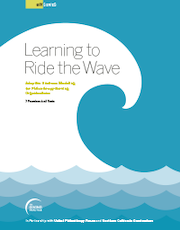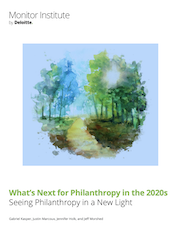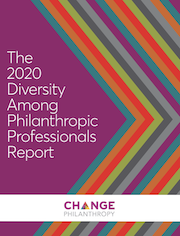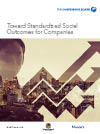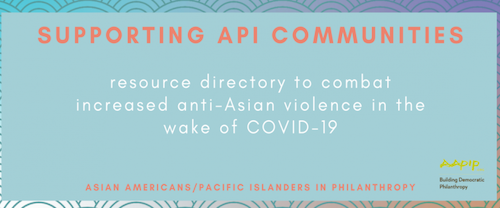Site Search
- resource provided by the Forum Network Knowledgebase.
Search Tip: Search with " " to find exact matches.
The Council of New Jersey Grantmakers is pleased to release our annual look back at the Council’s robust programming, leadership initiatives and advocacy efforts. From funder briefings to our Signature events to providing New Jersey’s philanthropic sector with integral connections and services – CNJG is an engaged and cohesive network of grantmakers dedicated to our state’s communities and people.
2016 marked a new high mark for the Council of New Jersey Grantmakers and for our members. The 2016 President’s Report is our annual look back at CNJG’s robust programming and services in benefit to our members and by extension, the communities that our members serve. These programs, services and leadership initiatives elevate not only our members’ work and practice, but also grantmakers throughout New Jersey, and often even beyond. CNJG remains at the ready to assist New Jersey grantmakers in meeting the ongoing challenges of yesterday and today.
The 2017 President’s Report is our annual look back at CNJG’s robust programming and services in benefit to our members and by extension, the communities that our members serve. These programs, services and leadership initiatives elevate not only our members’ work and practice, but also grantmakers throughout New Jersey, and often even beyond. CNJG remains at the ready to assist New Jersey grantmakers in meeting the ongoing challenges of yesterday and today.

CNJG’s Newark Philanthropic Liaison, Kevin Callaghan, organized a series of webinars for our Newark Funders Affinity Group and other funders to know the specific challenges of New Jersey’s largest city responding to the COVID-19 pandemic. Guest speakers included, Mayor Ras Baraka, Newark Public Schools Superintendent Roger Leon, consulting firm McKinsey & Co., and Catherine Wilson, CEO of United Way of Greater Newark.
At a recent Ocean & Monmouth Funders Roundtable, the group discussed all of the different databases and lists of nonprofits available to philanthropy to be able to research new and different nonprofits.
Facing Our Future was a landmark initiative looking at the systemic, long term fiscal challenges facing all levels of government in New Jersey. It grew out of a 2010 briefing CNJG held for members that outlined how a Governor’s budget is annually crafted. CNJG leadership worked with members to convene a group of enthusiastic former government leaders. Their collective experience crossed party lines, and many of them had served multiple New Jersey governors. This Leadership Group included 4 former Attorney Generals, 3, former Commissioners, 2 former State Treasurers, a former Director of the State Senate and a former Chief Justice of the NJ Supreme Court, in addition to leading New Jersey researchers.
Facing Our Future became an independent, bipartisan effort under the auspices of CNJG. It has produced 3 different reports that centered on the same theme.
In response to the murders of George Floyd, Breonna Taylor, Tony McDade, Ahmaud Arbery, and countless other Black individuals, we have seen a call to end systemic racism, police brutality, and injustice. To explore philanthropy's role in fighting against racism and injustice, CNJG is sharing information about upcoming programs that we and our Philanthropy-Serving Organizations are presenting and other resources below. While some programs or resources have been organized in direct response to recent protests and calls for action, all are part of a longer conversation on racism in our country and within our sector. As CNJG weaves equity into all of our work, we look forward to continuing these conversations with you.
We realize this is not a comprehensive list, and we are posting items that CNJG staff sees, which is not nearly enough. We ask that our members, especially those who are black and brown, to help us find articles written by, resources created by, and programs led by people of color. Share those resources by emailing us. This page is just a part of our work in equity. We created this page as one starting point for New Jersey’s philanthropic community to engage in conversations, do background reading, attend programs, learn, and take action.
For those members interested in continuing the conversations, we invite you to join our Racial Equity listserve, by emailing Craig Weinrich. On that listserve, members can share information, resources, and opportunities that are helpful to the funding community.
Visit these Websites
Asian Americans/Pacific Islanders in Philanthropy (AAPIP) Resource Directory
This Supporting API Communities Resource Directory was developed to mobilize the philanthropic sector towards meaningful action in the midst of heightened violence and hate targeting Asian American communities.
Participatory Grantmaking
A curated list of resources and articles from Candid on the movement of participatory grantmaking that engages the community in the grantmaking process.
The Power of Asset Framing: A Conversation with Trabian Shorters
This blog post by the Skillman Foundation contains a series of short videos by Trabian Shorters, founder and CEO of BMe Community, who describes shifts in narrative that all philanthropy should consider.
Putting Racism on the Table
This site created by the Washington Regional Association of Grantmakers is the inspiration for CNJG’s Race, Racism and the Ramifications for Philanthropy Series.
Race to Lead Series
A site with reports and surveys on the racial leadership gap in the nonprofit sector.
Stanford Social Innovation Review
The Struggle to Overcome Racism, a list of resources to help leaders of social change and activists.
Trust-Based Philanthropy Project
A peer-to-peer learning and advocacy initiative to make philanthropy more based on trust.
Small BIPOC organizations and/or historically excluded/led
organizations have greater access to funding.
Affirmation: We must center the most marginalized, underfunded, and impactful organizations.
BIPOC, grassroots, and/or historically excluded1 leaders are the most proximate to the populations and communities that face the most pressing social issues and should be central to designing solutions and funded; yet they are often overlooked or ignored as real change-makers.
They are underinvested in by major funders and are often left to struggle on their own; and when they are funded, grants are small and often highly restricted.
Some funders have artificially high budget requirements, require collaboration with larger “more sophisticated” organizations, won’t fund fiscally sponsored groups, or emphasize leadership requirements that are increasingly out of date or exclude vital lived experience.
Community organizations are exploring innovative and egalitarian management structures, such as co-directorships, collectives, and collaboratives, that do not resemble the constructs of the past.
Leadership comes in all structures, sizes, and identities; funders must seek to recognize and fund those who are doing effective work and re-evaluate their views of accepted leadership patterns. For BIPOC, grassroots, and/or historically excluded leaders to succeed, we must provide flexible resources and professional development support while they are leading.
Activities
Below are activities your organization can engage in that will advance your equity focus
• Agree as a community of practice to a shared definition of BIPOC, grassroots, and/or historically excluded-led organizations to foster a common frame of reference to help guide this work.
• Create networking and referral opportunities for BIPOC, grassroots, and/or historically excluded leaders to expand their access to funding and opportunities similar to that of larger, mainstream groups.
• Invest in the development and pipeline of BIPOC, grassroots, and/or historically excluded leaders.
• Remove funding barriers for small BIPOC, grassroots, and/or historically excluded organizations that have traditionally been precluded from funding because of budget size, leadership structure, auditing requirements, and similar obstacles.
• Actively partner with BIPOC, grassroots, and historically excluded organizations to make funding decisions on issues closest to their communities.
• Provide significant, multi-year, general operating funding to organizations and movements led by BIPOC, grassroots, and/or historically excluded communities.
Short-term Outcomes
• Progress is tracked into addressing the barriers to funding BIPOC, grassroots, and historically excluded-led organizations in NJ.
• A greater number of BIPOC, grassroots, and/or historically excluded-led organizations are funded than before, by new and existing funders.
• Professional development and capacity building as requested by BIPOC, grassroots, and/or historically excluded leaders is funded.
Long-term Outcomes
• BIPOC, grassroots, and/or historically excluded leaders can access funding and opportunities similar to that of larger, mainstream groups.
• A greater percentage of support to organizations and movements led by BIPOC, grassroots, and historically excluded communities is provided as significant, multi-year, general operating funding. In this context, “significant” can refer to both the quantity, size or percentage of grants awarded by the funder in any given year.
How to Begin Doing Good Better on Equity
Learning opportunities
• Which criteria and practices are creating, perpetuating or exacerbating exclusion of BIPOC, grassroots, and or historically excluded-led organizations?
• For funders that exclude or limit funding to small organizations, why are these barriers in place? What biases or missed opportunities are resulting from these obstacles?
• When funders are actively prioritizing BIPOC, grassroots, and historically excluded -led organizations in their philanthropic partnerships, what definitions, outreach, and partnership strategies are being used? How has this evolved based on lessons learned?
Pre-Work
• Funders should become educated about how traditional ways of identifying grantees and other criteria often excludes BIPOC, grassroots, and/or historically excluded-led organizations.
• Actively seek and share ways to center, identify, fund, and partner with applicants or community-based partners to create solutions in all efforts.
• Identify forums or protocols for introductions, dialogue, and relationship-building between funding community and BIPOC, grassroots and/or historically excluded-led organizations to pave the way for ongoing or stronger partnerships.
Launching New Jersey’s Philanthropy Hub
NJ’s one-stop, most comprehensive source for grantmaking data and nonprofit insights.
Philanthropy is most effective when it is transparent, informed, and collaborative. The New Jersey Philanthropy Hub brings the state’s giving landscape into clear view—empowering funders, nonprofits, and policymakers to strengthen communities, drive innovation, and build a more equitable future for all New Jerseyans.
Developed by Impala and launched by the Council of New Jersey Grantmakers in partnership with the New Jersey Center for Nonprofits, this free, open-access platform provides an unprecedented view of New Jersey’s nonprofit and philanthropic sector.
Jersey-wide Access
All New Jersey-based nonprofits, including all members of CNJG and the New Jersey Center for Nonprofits, receive complimentary access to the NJ Philanthropy Hub and Impala Core through October 2028.
Funders and their nonprofit partners (even grantees in different states) also receive complimentary access to the NJ Philanthropy Hub and Impala Core through October 2028.
What You’ll Find Inside
Comprehensive Landscape View
Profiles of all thousands of New Jersey nonprofits and philanthropic foundations, with financials, staffing, and giving history.
Smart Classification
Explore organizations organized into curated ecosystems, such as environment, health, and education, so you can quickly find peers, partners, or grantees.
Deep Grant Transparency
See every grant awarded to a New Jersey nonprofit, from every foundation across the country, revealing who is funding what and where new opportunities lie.
Clear and Actionable Insights
Track giving flows, spot gaps and overlaps, and benchmark your organization against peers across size, mission, and geography.
Who It’s For
Funders: Discover new grantees, identify funding gaps, and coordinate with peers to maximize impact.
Nonprofits: Showcase your work, connect with funders, and access every grant given to New Jersey nonprofits.
Researchers, Policymakers & Media: Gain clear, comprehensive insights into New Jersey’s philanthropic sector.
Join Us for the Launch
Celebrate the launch of the New Jersey Philanthropy Hub at our two special Zoom events:
For Nonprofits – October 23 at 12:00 PM
Learn how your organization can use the Hub to showcase your work, explore funding opportunities, and connect with new partners.
Register for the Nonprofit Launch Event
For Grantmakers & Foundations – October 24 at 12:00 PM
Discover how the Hub can help you identify funding gaps, collaborate with peers, and maximize your impact across the state.
Register for the Grantmaker Launch Event
Sponsor Acknowledgement
CNJG and the New Jersey Center for Nonprofits sincerely thank the following organizations for their crucial support of the NJ Philanthropy Hub that enables us to offer this for free for all nonprofits and funders in New Jersey through October 2028: The Campbell's Company, Community Foundation of New Jersey, F.M. Kirby Foundation, Grunin Foundation, Princeton Area Community Foundation, PSEG Foundation, and Robert Wood Johnson Foundation.
Join the Council of New Jersey Grantmakers -- your New Jersey-based community of practice for funders!
CNJG supports the philanthropic sector through shared learning, collaborative and trusting relationships, thought leadership, and advocacy efforts. By joining CNJG as a member, your grantmaking organization is connected to dozens of other organizations across the state that give out grants, and you support the work that, in turn, benefits you and New Jersey’s philanthropic sector.
Nonprofits: We recommend you joining the New Jersey Center for Nonprofits, as nonprofit organizations who do not have a grantmaking program are ineligible to join CNJG.
A sample conflict of interest form for independent private foundations.
